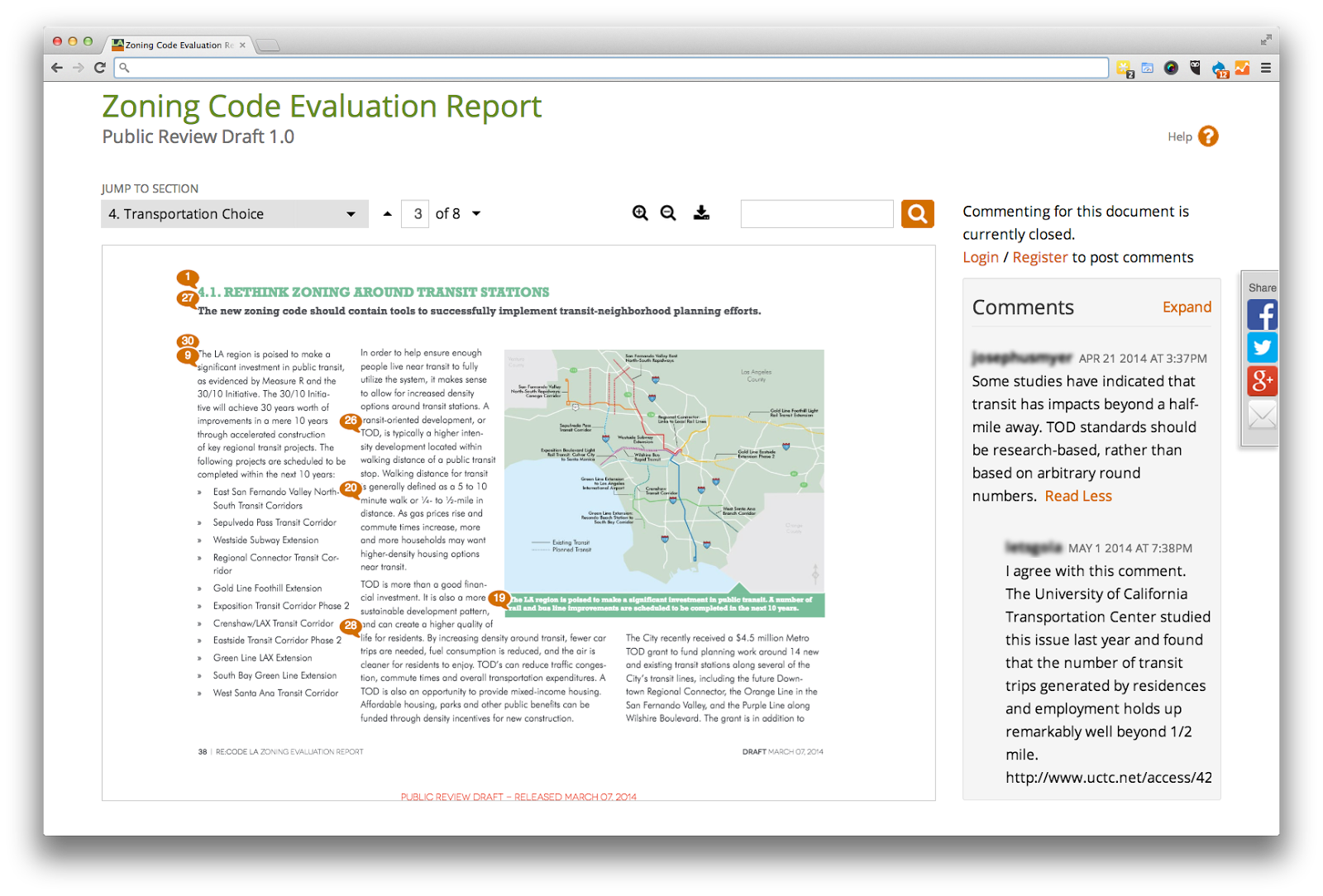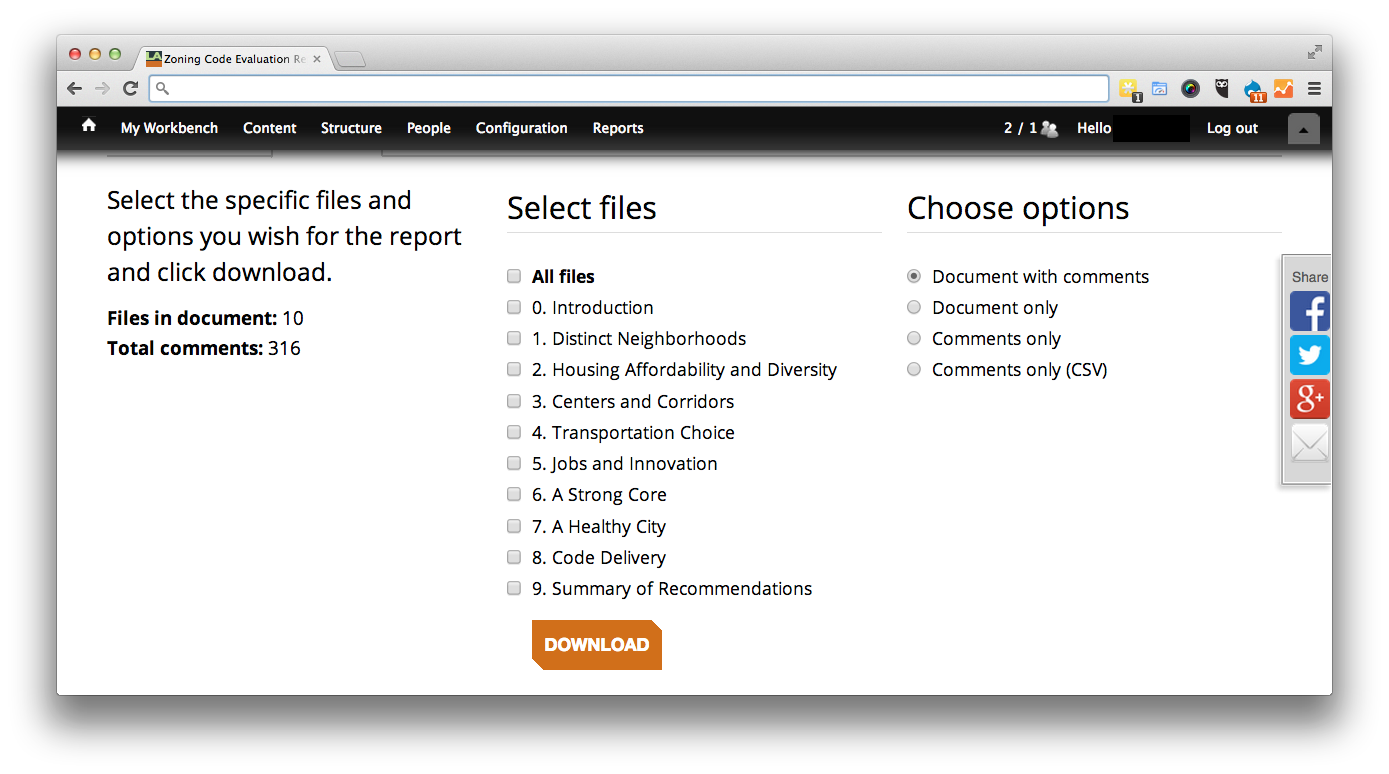How do you collect public comments on a web-based PDF planning document? It should be simple. But it isn't.

When Lee Einsweiler and Colin Scarff at Code Studio (Austin, Texas) completed a draft of the Zoning Code Evaluation Report for the city of Los Angeles' massive zoning code rewrite project, they ran into the same problem they've encountered dozens of times across the country.
It's a problem that planners run into every time we produce a draft document that requires public feedback.
How do you collect public comments on a web-based PDF planning document? It should be simple. But it isn't.
Usually, we publish the PDF on the web and invite residents to email in their comments. This is a messy and decidedly inelegant solution. Nobody likes to download and read a PDF, and when the comments come in, it's hard to track and match them up with the text in the document.
Erick Lopez is a tech-savvy city planner in the Los Angeles Department of City Planning, tasked with ensuring that the city's new zoning code is optimized for the web. He believed this was a solvable problem, and charged the team with coming up with a thoughtful solution that the city could use to collect feedback on the myriad of documents that would be produced through the five-year, $5 million zoning code rewrite project.
Erick was right. Code-named "MarkUp," the result is a very simple web interface that displays a PDF document by chapter, allowing visitors to "click" on any line in the document to simply add a comment.
Visitors can see the comments left by others and respond to their comments. To leave a comment, visitors login or use their Facebook or LinkedIn account.

Image 1: Screenshot of MarkUp on the recode.la website, with comments placed on top of the PDF.
The challenge arising from people who are argumentative or leave inappropriate comments was solved with the simplest possible use of crowdsourcing: If enough visitors mark a comment as abusive, the comment is unpublished until it can be reviewed by a staff member.
Lee and Colin recognized the opportunity to design a version of the report that would combine the original PDF with all the public comments. This enabled 316 comments received by the team to be automatically converted into a unified document that could be viewed alongside the text.

Image 2: Staff access a web-based interface which enables exporting of PDF documents with comments alongside the text to which it refers.
Based on the success of MarkUp to collect feedback on the PDF, the Planning Department and Urban Insight soon received calls from several other cities trying to solve similar problems. Based on these requests, Urban Insight has rewritten the system into a cloud-based project called OpenComment, https://www.opencomment.us.
By using the power of the cloud and open source software, cities, counties, and other organizations now have a relatively affordable, securely-hosted option to quickly upload PDF documents and empower visitors to comment on them on a website.
How do you collect public comments on a web-based PDF? Erick was right. This is a solvable problem: https://www.opencomment.us.
Chris Steins is the co-founder of Planetizen and Planetizen Courses and the CEO of Urban Insight, a technology consulting firm working with Code Studio and the Los Angeles Department of City Planning to develop the first modern, web-based zoning code.

Planetizen Federal Action Tracker
A weekly monitor of how Trump’s orders and actions are impacting planners and planning in America.

Chicago’s Ghost Rails
Just beneath the surface of the modern city lie the remnants of its expansive early 20th-century streetcar system.

Amtrak Cutting Jobs, Funding to High-Speed Rail
The agency plans to cut 10 percent of its workforce and has confirmed it will not fund new high-speed rail projects.

Ohio Forces Data Centers to Prepay for Power
Utilities are calling on states to hold data center operators responsible for new energy demands to prevent leaving consumers on the hook for their bills.

MARTA CEO Steps Down Amid Citizenship Concerns
MARTA’s board announced Thursday that its chief, who is from Canada, is resigning due to questions about his immigration status.

Silicon Valley ‘Bike Superhighway’ Awarded $14M State Grant
A Caltrans grant brings the 10-mile Central Bikeway project connecting Santa Clara and East San Jose closer to fruition.
Urban Design for Planners 1: Software Tools
This six-course series explores essential urban design concepts using open source software and equips planners with the tools they need to participate fully in the urban design process.
Planning for Universal Design
Learn the tools for implementing Universal Design in planning regulations.
Caltrans
City of Fort Worth
Mpact (founded as Rail~Volution)
City of Camden Redevelopment Agency
City of Astoria
City of Portland
City of Laramie





























